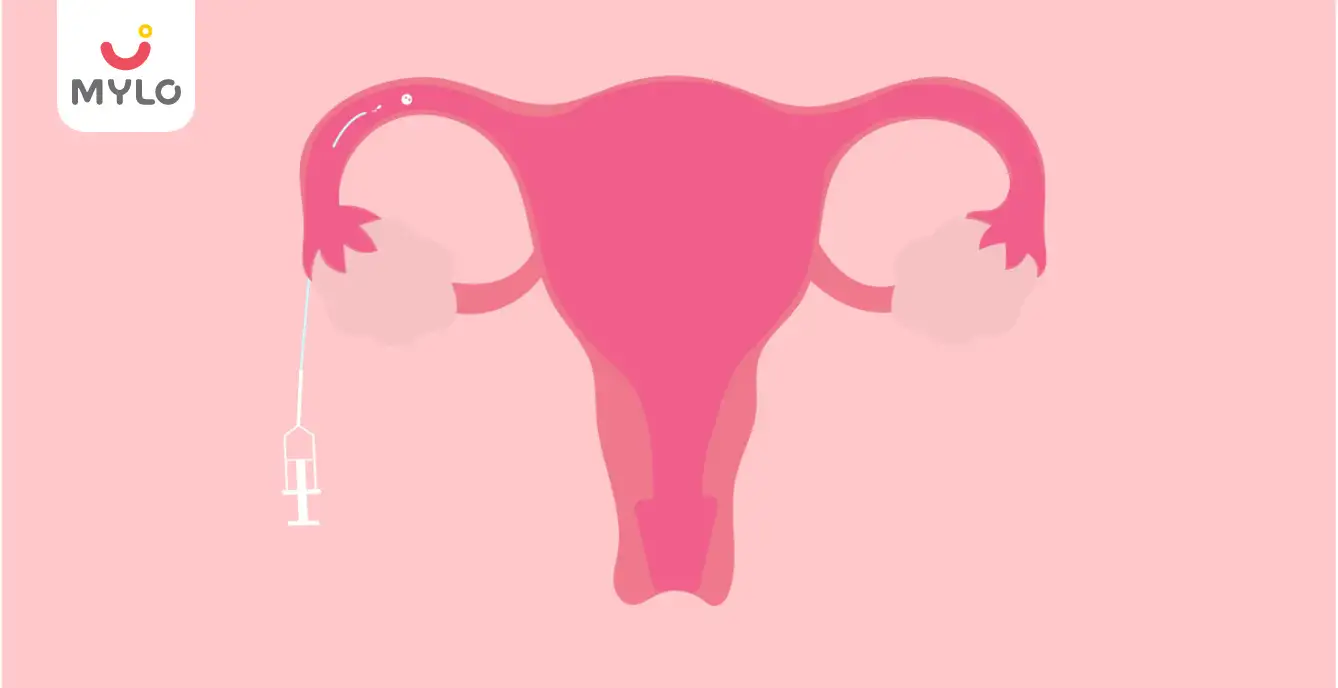Home

The Hormonal Dance: Understanding Which Hormones Regulate Menstrual Cycle
In this Article

Hormones
The Hormonal Dance: Understanding Which Hormones Regulate Menstrual Cycle
Updated on 7 September 2023



Medically Reviewed by
Dr. Shruti Tanwar
C-section & gynae problems - MBBS| MS (OBS & Gynae)
View Profile

You must have experienced or heard about the rollercoaster of emotions just before your periods, and it must have made you wonder which hormones regulate menstrual cycle! It's like your heart becomes a DJ, spinning tracks of tears, irritability, and mood swings. One moment you're crying over a silly thing, and next, you snap at the slightest provocation. Remember, it's just your hormones having a dance party inside you. Hang in there; the emotional storm will pass!
Let's begin to understand the delicate choreography of the hormonal dance and which are the hormones that regulate menstrual cycle, the different stages of menstrual cycle, the role of hormones, and ways to identify hormonal imbalances explicitly.
Understanding Menstrual Cycle
The menstrual cycle is a natural process that occurs in the female body. It is a monthly cycle that prepares the reproductive system for pregnancy. The rotation usually lasts about 28 days but can vary for each person.
During this time, the body goes through different phases, each with specific characteristics and functions. These phases include menstruation, when the uterus sheds its lining; follicular phase, when an egg matures in the ovary; ovulation, when the egg is released; and the luteal phase when the uterus prepares for potential implantation.
The Four Stages of Menstrual Cycle
The menstrual cycle consists of four distinct stages that repeat monthly. Each stage plays a crucial role in the reproductive process. Let's explore these stages:
1. Menstruation (Days 1-5)
The menstrual cycle begins with menstruation, commonly known as a period. During this phase, the uterus sheds its inner lining, bleeding. This occurs when pregnancy has not taken place in the previous cycle. Hormone levels, particularly estrogen, and progesterone, are low during this stage.
2. Follicular Phase (Days 6-14)
The follicular phase marks the development of follicles in the ovaries. These follicles contain immature eggs. As the follicles grow, they release estrogen, stimulating the thickening of the uterine lining in preparation for pregnancy. Towards the end of this phase, one dominant follicle emerges, while others regress.
3. Ovulation (Day 14)
Ovulation is a pivotal stage in the menstrual cycle when the mature egg is released from the ovary. This typically occurs around day 14 of a 28-day cycle but can vary. The luteinizing hormone (LH) surge triggers the egg's release. The egg then travels through the fallopian tube, ready to be fertilized.
4. Luteal Phase (Days 15-28)
After ovulation, the ruptured follicle in the ovary transforms into the corpus luteum. The corpus luteum produces progesterone, which helps prepare the uterus for the potential implantation of a fertilized egg. If fertilization doesn't occur, hormone levels drop, leading to the shedding of the uterine lining and the start of a new menstrual cycle.
Understanding the four stages of menstrual cycle provides valuable insights into reproductive health.
Which Hormones Regulate Menstrual Cycle?
The menstrual cycle is regulated by a delicate interplay of hormones that work together during various stages. The hormones regulating menstrual cycle include:
- Follicle-Stimulating Hormone (FSH)
- Luteinizing hormone (LH)
- Estrogen and Progesterone
- Gonadotropin-releasing hormone (GnRH) and Prolactin
1. Follicle-Stimulating Hormone (FSH) and Luteinizing Hormone (LH)
FSH is produced by the pituitary gland, located at the base of the brain. It stimulates the growth and development of follicles in the ovaries. These follicles contain immature eggs that will be released during ovulation.
2. Estrogen and Progesterone
The ovaries primarily produce these hormones. Estrogen plays a crucial role in thickening the uterine lining during the follicular phase of the menstrual cycle. It also helps stimulate the release of LH, triggering ovulation.
Progesterone, on the other hand, is primarily produced during the luteal phase. It prepares the uterus for the potential implantation of a fertilized egg and helps maintain the uterine lining. Understanding the hormones regulating menstrual cycle and their role is vital in comprehending the complex workings of the menstrual cycle and its impact on reproductive health.
3. Gonadotropin-releasing hormone (GnRH) and Prolactin
GnRH regulates the release of other hormones of ovulation and the menstrual cycle. It stimulates the pituitary gland to produce follicle-stimulating hormone (FSH) and luteinizing hormone (LH), which in turn stimulate the development and release of eggs from the ovaries.
Prolactin, on the other hand, primarily plays a role in lactation and milk production but can also influence the menstrual cycle. High levels of prolactin can interfere with ovulation and cause irregular periods. So, while GnRH keeps the cycle's rhythm in check, prolactin adds special notes to the symphony of female reproductive hormones.
How Can Hormonal Imbalances Affect the Menstrual Cycle?
Hormonal imbalances can significantly impact the menstrual cycle, leading to irregularities or disruptions in its normal functioning. Here are some ways in which hormonal imbalances can affect the menstrual cycle:
1. Irregular or Absent Periods
Hormonal imbalances can cause irregular menstrual cycles, with varying cycle lengths or unpredictable periods. In some cases, hormonal imbalances may even lead to the absence of periods, known as amenorrhea.
2. Heavy or Prolonged Menstrual Bleeding
Imbalances in hormones, particularly estrogen, and progesterone, can result in heavy or prolonged menstrual bleeding. This can be accompanied by severe cramping and discomfort.
3. Ovulation Problems
Hormonal imbalances can disrupt the ovulation process. Anovulation, which refers to the absence of ovulation, or irregular ovulation, can occur, affecting fertility and the ability to conceive.
4. Premenstrual Syndrome (PMS)
Hormonal imbalances, particularly fluctuations in estrogen and progesterone levels, can contribute to the development of premenstrual syndrome. PMS symptoms may include mood swings, bloating, breast tenderness, and fatigue.
5. Polycystic Ovary Syndrome (PCOS)
PCOS is a hormonal disorder characterized by imbalances in insulin and androgen levels. This condition can lead to irregular menstrual cycles, ovarian cysts, and fertility issues.
6. Thyroid Disorders
The thyroid gland produces hormones that play a crucial role in regulating the menstrual cycle. Imbalances in thyroid hormone levels, such as hypothyroidism or hyperthyroidism, can disrupt menstrual regularity.
7. Menopause Transition
As women approach menopause, hormonal fluctuations occur, leading to irregular periods, changes in cycle length, and other symptoms associated with perimenopause.
Understanding which hormones regulate menstrual cycle not only provides you a better understanding of the cycle but also of the hormonal changes taking place in your body. It's important to note that hormonal imbalances can have various causes, including stress, certain medical conditions, lifestyle factors, and underlying health issues.
How to Track your Menstrual Cycle and Identify Hormonal Imbalances?
Tracking your menstrual cycle and identifying hormones that regulate menstrual cycle can help you understand your body's hormonal patterns and identify any irregularities. Here are some methods you can use to track your menstrual cycle and identify hormonal imbalances:
1. Menstrual Calendar
Keep a record of your menstrual periods' start and end dates on a calendar or in a menstrual tracking app. This will help you identify the length of your menstrual cycle and any irregular duration.
2. Basal Body Temperature (BBT) Charting
Using a basal body thermometer, measure your basal body temperature every morning before getting out of bed. Charting your BBT over time can help you identify the shift in temperature that occurs during ovulation, indicating the release of an egg. A consistently low or high BBT may suggest hormonal imbalances.
3. Cervical Mucus Observation
Pay attention to changes in your cervical mucus throughout your cycle. Around ovulation, cervical mucus becomes clear, slippery, and stretchy, resembling egg whites. Tracking these changes can help you determine your fertile window and assess the quality of your cervical mucus, influenced by hormonal changes.
4. Ovulation Predictor Kits (OPKs)
These kits detect the luteinizing hormone (LH) surge before ovulation. By testing your urine with ovulation predictor kit, you can identify the peak fertility period and confirm ovulation. Consistently positive or negative results may indicate hormonal imbalances.
5. Symptom Tracking
Take note of any physical or emotional symptoms you experience throughout your menstrual cycle. Common symptoms related to hormonal imbalances include breast tenderness, mood swings, acne, bloating, or changes in libido. Tracking these symptoms can help you identify patterns or irregularities.
6. Hormone Testing
If you suspect a hormonal imbalance, consult a healthcare provider who may recommend hormone testing. This can involve blood tests to measure hormone levels such as estrogen, progesterone, FSH, LH, and thyroid hormones. The results can provide insights into any hormonal imbalances affecting your menstrual cycle.
Key Takeaways
In conclusion, a delicate balance of hormones beautifully regulates the menstrual cycle. Each hormone plays a specific role in different stages, ensuring the development and release of eggs, thickening of the uterine lining, and shedding the lining in case of non-fertilization.
Understanding which hormones regulate menstrual cycle and the stages of menstrual cycle can help you gain insights into fertility, identify hormonal imbalances, and take proactive steps to maintain a healthy menstrual cycle. So, let us appreciate the fascinating symphony of hormones that governs the ebb and flow of a woman's reproductive journey.
References
- Hawkins, S. M., & Matzuk, M. M. (2008). The Menstrual Cycle. Annals of the New York Academy of Sciences
- Reed, B. G., & Carr, B. R. (2018). The Normal Menstrual Cycle and the Control of Ovulation. NIH





Medically Reviewed by
Dr. Shruti Tanwar
C-section & gynae problems - MBBS| MS (OBS & Gynae)
View Profile


Written by
Mylo Bestie
Mylo Bestie is that naughty, funny soulmate who lightens your life and whom you can tell your deepest secrets!
Read MoreGet baby's diet chart, and growth tips

Related Articles
Related Questions
Influenza and boostrix injection kisiko laga hai kya 8 month pregnancy me and q lagta hai ye plz reply me

Hai.... My last period was in feb 24. I tested in 40 th day morning 3:30 .. That is faint line .. I conculed mylo thz app also.... And I asked tha dr wait for 3 to 5 days ... Im also waiting ... Then I test today 4:15 test is sooooo faint ... And I feel in ma body no pregnancy symptoms. What can I do .

Baby kicks KB Marta hai Plz tell mi

PCOD kya hota hai

How to detect pcos

RECENTLY PUBLISHED ARTICLES
our most recent articles

Cold & Cough
7 home remedies to cure cough and cold in infants

Conception
How to Increase Endometrial Thickness: Your Guide to Science-Backed Tips

Conception
Endometrial Scratching: The Ultimate Guide to Meaning, Benefits and Impact on Conception

Bathing
The Ultimate Guide to Buying a Baby Bath Tub for New Parents

Diet & Nutrition
Strawberry in Pregnancy: Why Should This Fruit Be on Your Pregnancy Platter?

Pregnancy Journey
Benefits of Wearing a Pregnancy Belt Before Delivery
- PCOS Treatment in Homeopathy: The Ultimate Guide to Natural Remedies
- Manjistha: Ayurveda's Best-Kept Secret for Health and Beauty
- Metformin for PCOS: How This Medication Can Help Regulate Hormonal Imbalances
- 5 Tips on How to Get Pregnant When You Are Fat
- Do Antibiotics Affect Fertility: Debunking Common Myths and Misconceptions
- Disadvantages of Releasing Sperm Daily: Debunking Common Myths
- Varicocele Surgery Cost: What You Need to Know Before You Go Under the Knife
- Testicular Pain: Don't Ignore, Know When to Seek Medical Attention
- PCOS with Regular Periods: Understanding the Symptoms and Implications
- Bulky Uterus: What You Need to Know About this Common Gynecological Issue
- Mylo Baby Wipes Review
- PCOS Treatment in Ayurveda: The Ultimate Guide to Natural Treatment Options
- PCOS Acne: The Ultimate Guide to Causes, Treatment and Management
- Maggi in Pregnancy: Is It Safe to Enjoy Your Favorite Instant Noodles?


AWARDS AND RECOGNITION

Mylo wins Forbes D2C Disruptor award

Mylo wins The Economic Times Promising Brands 2022
AS SEEN IN

- Mylo Care: Effective and science-backed personal care and wellness solutions for a joyful you.
- Mylo Baby: Science-backed, gentle and effective personal care & hygiene range for your little one.
- Mylo Community: Trusted and empathetic community of 10mn+ parents and experts.
Product Categories
baby carrier | baby soap | baby wipes | stretch marks cream | baby cream | baby shampoo | baby massage oil | baby hair oil | stretch marks oil | baby body wash | baby powder | baby lotion | diaper rash cream | newborn diapers | teether | baby kajal | baby diapers | cloth diapers |




